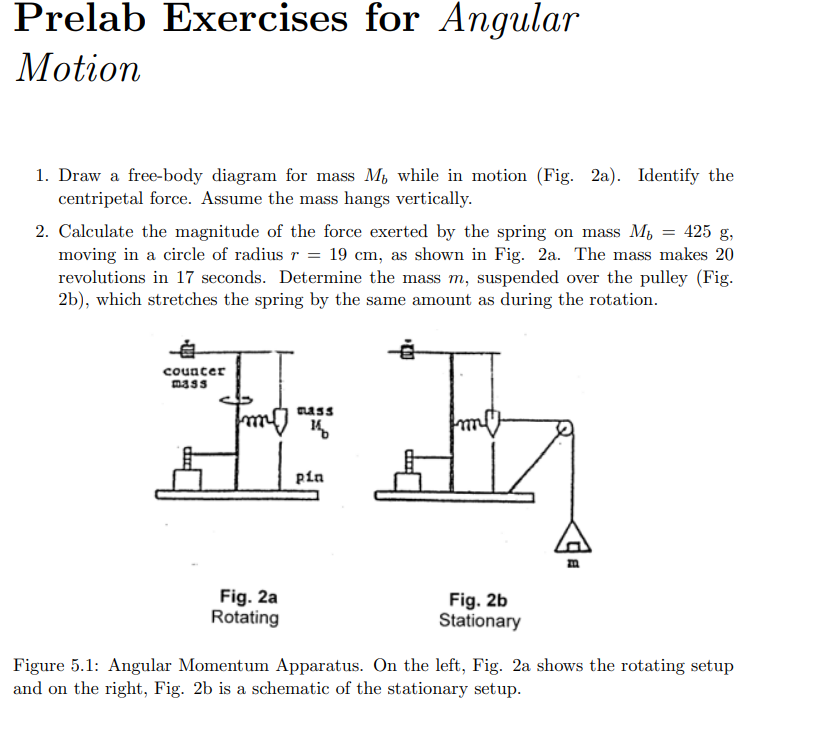Prelab Exercises for Angular Motion 1. Draw a free-body diagram for mass M, while in motion (Fig. 2a). Identify the centripetal force. Assume the mass hangs vertically. = 425 g, 2. Calculate the magnitude of the force exerted by the spring on mass M₁ moving in a circle of radius r = 19 cm, as shown in Fig. 2a. The mass makes 20 revolutions in 17 seconds. Determine the mass m, suspended over the pulley (Fig. 2b), which stretches the spring by the same amount as during the rotation. counter mass Imm) class 14 ਜਾ Ha pin Fig. 2a Rotating Fig. 2b Stationary Figure 5.1: Angular Momentum Apparatus. On the left, Fig. 2a shows the rotating setup and on the right, Fig. 2b is a schematic of the stationary setup.
Prelab Exercises for Angular Motion 1. Draw a free-body diagram for mass M, while in motion (Fig. 2a). Identify the centripetal force. Assume the mass hangs vertically. = 425 g, 2. Calculate the magnitude of the force exerted by the spring on mass M₁ moving in a circle of radius r = 19 cm, as shown in Fig. 2a. The mass makes 20 revolutions in 17 seconds. Determine the mass m, suspended over the pulley (Fig. 2b), which stretches the spring by the same amount as during the rotation. counter mass Imm) class 14 ਜਾ Ha pin Fig. 2a Rotating Fig. 2b Stationary Figure 5.1: Angular Momentum Apparatus. On the left, Fig. 2a shows the rotating setup and on the right, Fig. 2b is a schematic of the stationary setup.
Elements Of Electromagnetics
7th Edition
ISBN:9780190698614
Author:Sadiku, Matthew N. O.
Publisher:Sadiku, Matthew N. O.
ChapterMA: Math Assessment
Section: Chapter Questions
Problem 1.1MA
Related questions
Question

Transcribed Image Text:Prelab Exercises for Angular
Motion
1. Draw a free-body diagram for mass M, while in motion (Fig. 2a). Identify the
centripetal force. Assume the mass hangs vertically.
2. Calculate the magnitude of the force exerted by the spring on mass M = 425 g,
moving in a circle of radius r = 19 cm, as shown in Fig. 2a. The mass makes 20
revolutions in 17 seconds. Determine the mass m, suspended over the pulley (Fig.
2b), which stretches the spring by the same amount as during the rotation.
counter
mass
class
fmm (J
14
Fig. 2a
Rotating
Fig. 2b
Stationary
Figure 5.1: Angular Momentum Apparatus. On the left, Fig. 2a shows the rotating setup
and on the right, Fig. 2b is a schematic of the stationary setup.
pin
Expert Solution
This question has been solved!
Explore an expertly crafted, step-by-step solution for a thorough understanding of key concepts.
Step by step
Solved in 3 steps with 6 images

Knowledge Booster
Learn more about
Need a deep-dive on the concept behind this application? Look no further. Learn more about this topic, mechanical-engineering and related others by exploring similar questions and additional content below.Recommended textbooks for you

Elements Of Electromagnetics
Mechanical Engineering
ISBN:
9780190698614
Author:
Sadiku, Matthew N. O.
Publisher:
Oxford University Press

Mechanics of Materials (10th Edition)
Mechanical Engineering
ISBN:
9780134319650
Author:
Russell C. Hibbeler
Publisher:
PEARSON

Thermodynamics: An Engineering Approach
Mechanical Engineering
ISBN:
9781259822674
Author:
Yunus A. Cengel Dr., Michael A. Boles
Publisher:
McGraw-Hill Education

Elements Of Electromagnetics
Mechanical Engineering
ISBN:
9780190698614
Author:
Sadiku, Matthew N. O.
Publisher:
Oxford University Press

Mechanics of Materials (10th Edition)
Mechanical Engineering
ISBN:
9780134319650
Author:
Russell C. Hibbeler
Publisher:
PEARSON

Thermodynamics: An Engineering Approach
Mechanical Engineering
ISBN:
9781259822674
Author:
Yunus A. Cengel Dr., Michael A. Boles
Publisher:
McGraw-Hill Education

Control Systems Engineering
Mechanical Engineering
ISBN:
9781118170519
Author:
Norman S. Nise
Publisher:
WILEY

Mechanics of Materials (MindTap Course List)
Mechanical Engineering
ISBN:
9781337093347
Author:
Barry J. Goodno, James M. Gere
Publisher:
Cengage Learning

Engineering Mechanics: Statics
Mechanical Engineering
ISBN:
9781118807330
Author:
James L. Meriam, L. G. Kraige, J. N. Bolton
Publisher:
WILEY